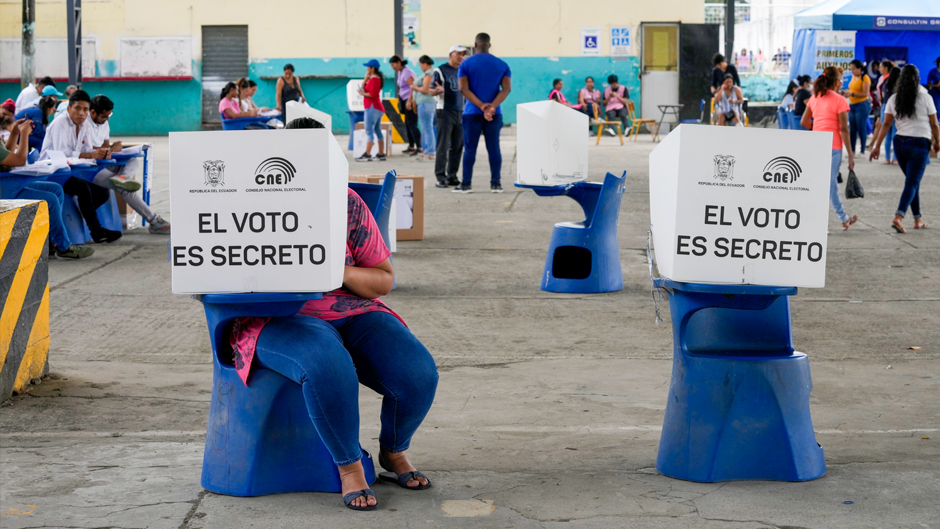Ecuador, a country considered peaceful and stable a few years ago, has become a violent-prone society, wracked by drug trafficking violence and corruption.
The recent assassination of Fernando Villavicencio, a presidential candidate who as a journalist was a fierce critic of the powerful and corrupt, brought to light the challenges facing the country.
“Villavicencio the candidate was very vocal against corruption and organized crime and that was seen as a threat by the illicit traffickers who have really dug in, having found Ecuador to be a lucrative trans-shipment route to the Pacific from Colombia and Peru,” said John Twichell, director of the Latin American Studies Program in the University of Miami College of Arts and Sciences.
The election that took place on Aug. 20 has resulted in a runoff, since no candidate took more than 50 percent of the vote. Leftist candidate Luisa González of the Movimiento Revolucion Ciudadana will face Daniel Noboa of the National Electoral Council on Oct. 15.
Both candidates promise to combat the violence that is affecting the country. Gonzalez is seen as a protégé of former president Rafael Correa, who is in exile in Belgium, having been sentenced in absentia to eight years in prison for corruption.
“Ecuador is suffering from a very serious security crisis, and they are at a major social political crossroads with voters feeling very unsafe in addition to being fed up with corruption and a weak economy,” said Twichell.
In some ways the crisis the country faces came on suddenly while in other ways it has been building over time, Twichell added. The coronavirus pandemic has exacerbated the recent crisis, he noted. Yet characteristic of Latin America and the Caribbean, decades of neoliberal policies that withdrew social safety nets without offering new pathways to education have contributed to the rise of an informal and illicit economy, and as a result, led to a quadrupling of annual homicide rates. As polling showed, the electorate are both frightened and disillusioned, according to Twichell.
The special election took place after outgoing president Guillermo Lasso, faced with impeachment because of allegations of corruption, dissolved the National Assembly and called for early elections in a move referred to as “La Muerte Cruzada.”
“He was relatively experienced in Ecuadorian national politics; yet as the first conservative president to be elected in two decades, Lasso was unable to work with the National Assembly to address the macroeconomic challenges associated with the pandemic, leading to mass protests,” said Twichell. “Along with that we see a growing impatience among the electorate with corruption. Any connection drawn between a leader and corruption is intolerable. That was the final straw for Lasso.”
Whether González, a 45-year-old lawyer, and Noboa, a 35-year-old businessman and son to a banana tycoon, can deliver solutions to the Ecuadorian problems remains to be seen, Twichell pointed out.
González, a leftist who remains close to Correa, promises to redistribute government reserves toward provision of social programs not unlike what Correa did when in office with the hope of stemming violence by way of inclusion. Noboa, of the center right, promises to create more job opportunities, encourage foreign investment, and improve national security by positioning the military at Ecuador’s borders, Twichell said.
“González has been able to portray herself as someone who can take Ecuador back to what are now perceived by many as better days when the left was in power, the economy was good, and the country was safer,” Twichell said. “Noboa, a surprise victor in the first round, has positioned himself as someone who the youth of the country can identify more with and as the future of Ecuador.”
The election also brought a victory for many environmentalists in Ecuador. One referendum, which supported the ban on future oil extraction in the biodiverse section of the Ecuadorian Amazon’s Yasuni National Park, and the other which supported the halting of mining in the Chocó Andíno de Pichincha, were approved overwhelmingly. These decisions will protect Indigenous lands from development.
This victory for nature represented by the two referendum outcomes is to be celebrated. Yet it could be problematic in near macroeconomic terms. Ecuador’s government and broader economy relies heavily on oil exports and an alternative development model for the formal economy is not yet on the horizon, said Twichell.
“It is hard to draw any clear political conclusions from the first-round results in Ecuador compared to the recent elections in Argentina and Guatemala, where an antiestablishment sentiment was stark among the electorate results-wise,” Twichell said.
“Looking ahead to the second round on Oct. 15 and leading up to the vote,” Twichell said, “how will the candidates portray themselves at a time when one of their competitors was assassinated? And how will González and Noboa each appeal to voters as the best candidate able to guide Ecuador toward a new economy that is environmentally friendly but still competitive in the world market, all while addressing the major issues of corruption, insecurity and violence?”

